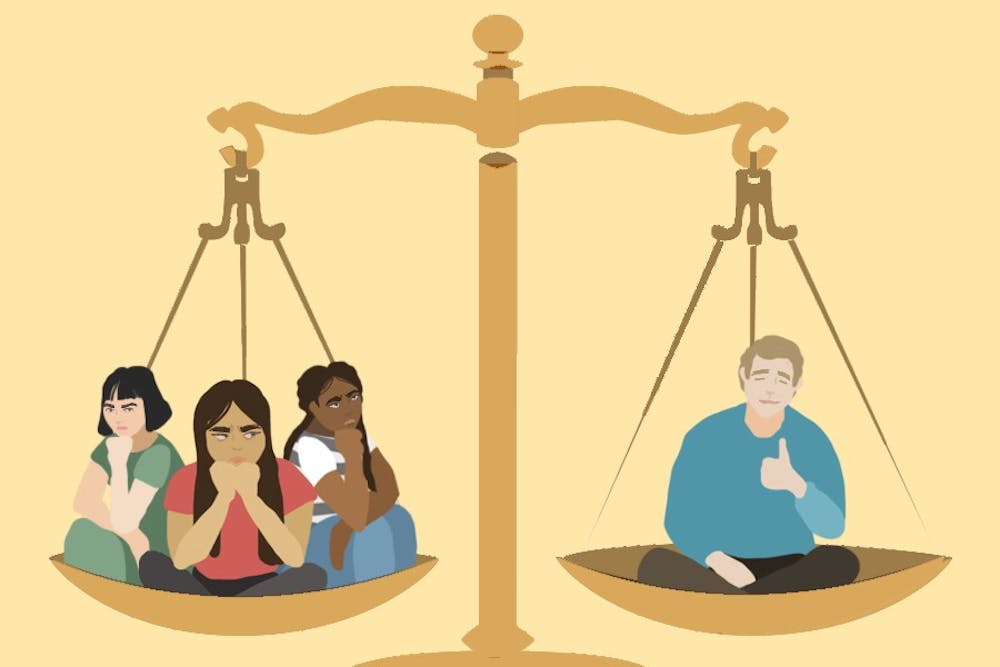In 2017, the word “feminist” is still often seen as a negative term. Many have made attempts to rectify this. Feminism just means you believe in equality of the sexes.
Right?
While the essential definition of feminism does indeed refer to the “belief in political, economic and social equality of the sexes,” this constantly recited phrase is often used to water down the tough issues, and it overlooks the fact that many problems can’t be solved by simply making things the same.
It has been incredibly refreshing to see feminism hit the mainstream. Who can forget Beyonce’s 2014 Video Music Awards performance, her silhouette standing like a warrior in front of the bold and bright letters spelling out “FEMINIST” while the powerful words of Nigerian writer Chimamanda Ngozi Adichie reverberated?
“Feminism” and “equality” have an integral relationship. In fact, they are one in the same, and it is critical that more people become aware and accepting of this definition. Saying "I’m not a feminist, but I believe men and women are equal” is like saying “I’m not an athlete, but I play professional sports for a living.”
But there are many feminist issues that can’t necessarily be solved with simple equality. Equality implies that all genders share the same experiences and solutions to gendered issues.
Take sexual assault, for example. Equality will not solve the issue of sexual assault. Sure, one could frame it in such a way by saying that women should have equal opportunity to attend parties and not worry about having their drink drugged.
But are these really issues of equality? Will striving to make things the “same” end gendered violence? Or will it just put women in an endless cycle of trying to catch up to an arbitrary standard of being, putting them in charge of ending their own oppression?
Breanne Fahs, an associate professor of women and gender studies at ASU, said radical feminism is about getting at the root of an issue rather than simply working to make things better within the existing system, in which the foundation is flawed.
The term “radical” may freak some people out, but Fahs points out that it simply means addressing the root cause of issues, not necessarily having extreme views.
Within-system change would involve progress such as women advancing in the workplace or passing certain types of legislation to address inequality, which are definitely important, but not enough.
“That stuff has value, but if it’s not paired with its more radical counterpart, we miss out on the bigger analysis of what’s at the root of women’s oppression,” Fahs said.
For example, from a radical feminist perspective, class inequality can’t be solved by just telling women to work harder at their jobs.
“Class inequality gets better when we look at the structures of why we allow a small number of wealthy people to continue to dominate the financial landscape of the country,” Fahs said.
A radical feminist framework is necessary to truly eradicate gender inequality.
Applying this framework to sexual assault may help dismantle problematic advice in sexual assault prevention. While it is refreshing to see more emphasis on consent on college campuses, there is more to the issue than telling women to watch what they drink and wear to avoid being raped.
Equality between men and women won't end rape. Instead, we must address the issue of why rape still happens.
There are a disturbing amount of rape advocacy and apologist groups. Most recently, the "Stealth Trend," in which men remove their condoms during sex without letting their partner know. Accepting this kind of behavior normalizes sexual assault and rape culture.
This problem isn’t going anywhere until we address the thoughts and influences that tell men that it’s okay to have sex with an unwilling or unconscious woman, whether that be peer pressure, the belief that women are objects to be taken, or that they “just can’t help it.”
“We don’t actually hold men accountable for thinking in these ways,” Fahs said. “ It’s always telling women, you need to be the ones to prevent violence for happening to you. That’s really insufficient.”
“Feminism just means equality”, while true on a surface-level, is often recanted to comfort people about the term and its goals. Don’t worry, women aren’t going to take men’s jobs or really negatively impact men’s lives in any way. Men don’t have to change anything. Women just want to be equal.
But not everything will be solved by making things the same, we must all work together, not just women alone.
Keep in mind that when I say feminism isn’t solely about equality, I’m not saying that it’s instead about female superiority, as a misguided many still believe.
The constant emphasis on equality overlooks many tough issues that should really involve holding the perpetrators of violence and oppression accountable rather than just bringing women up to the level of men.
I might be able to earn the same paychecks as my male counterparts. But until we aren’t afraid to speak up on the tough stuff, they will still have a safer walk home from work.
Reach the columnist at lallnatt@asu.edu or follow @LibbyAllnattASU on Twitter.
Editor’s note: The opinions presented in this column are the author’s and do not imply any endorsement from The State Press or its editors.
Want to join the conversation? Send an email to opiniondesk.statepress@gmail.com. Keep letters under 500 words and be sure to include your university affiliation. Anonymity will not be granted.
Like The State Press on Facebook and follow @statepress on Twitter.




